Class creates games for social change
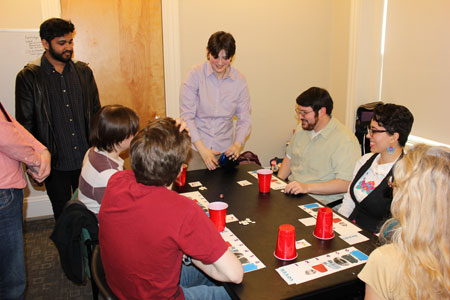
Lexie Oberwetter ’15 (standing) leads a game called Buzz Off!, which was developed in Associate Professor Eric Gordon’s Games for Social Change class, and presented at an open house at the Engagement Game Lab on April 25. (Photo by Dan O’Brien)
Students in Associate Professor Eric Gordon’s class that develops games for social change held an open house April 25 at the Engagement Game Lab to test and demonstrate their creations with students, faculty, and staff.
One group of students developed a game called Pack That Bag with the help of the Boston Public Health Commission.
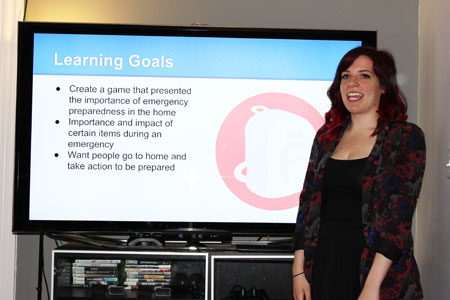
Melanie Trickett ’14 explains how the game Pack That Bag was created during the April 25 open house. (Photo by Dan O’Brien)
Designed to help children understand what to do in an evacuation, Pack That Bag pretends that aliens invade Boston and provides players with cards that indicate a survival item, such as a flashlight, baby food, or duct tape.
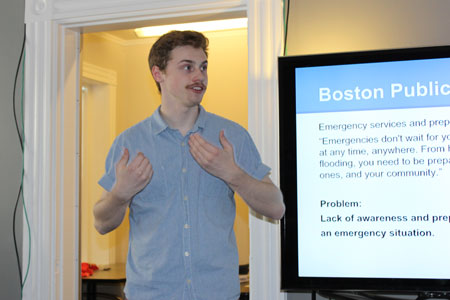
Blaise Fritsche ’15 presents Pack That Bag at the open house. (Photo by Dan O’Brien)
Using the floor as a life-size game board, players advance or don’t based on what survival cards they are holding. The game has been tested on students at the Warren Prescott School in Charlestown.
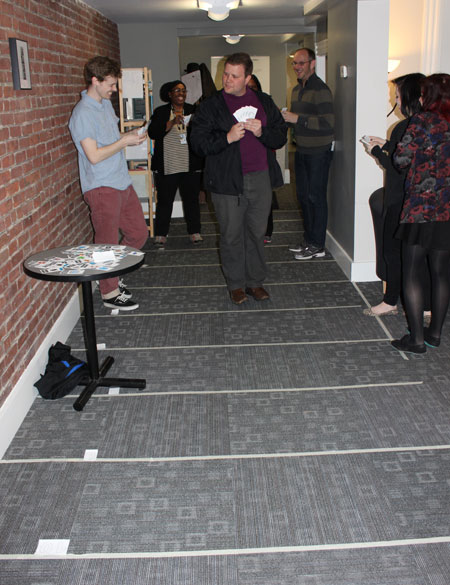
Students and staff members play Pack That Bag at the Engagement Game Lab’s open house April 25. (Photo by Dan O’Brien)
Another game, Buzz Off!, is a board game created with the help of the American Red Cross and is designed to educate people in developing countries how to prevent bug bites and prevent contracting dengue fever.
Two other games were featured at the open house. Disaster Matters is a game in which a group of people has to collaborate to protect against natural disasters, with the message that a community must work together in order to succeed.
The final game, Fleet Sweep, has players managing a fleet of vehicles for an international humanitarian organization.
 Gordon, who teaches in the Visual and Media Arts Department, is also the director of the Engagement Game Lab, an applied research lab at Emerson that designs and studies playful approaches to civic engagement.
Gordon, who teaches in the Visual and Media Arts Department, is also the director of the Engagement Game Lab, an applied research lab at Emerson that designs and studies playful approaches to civic engagement.
This month, the game lab worked with the United Nations Development Programme to launch an online game studying the youth unemployment issue in Moldova.
The lab has also launched numerous games to aid municipal planning processes using its Community PlanIt platform. Philadelphia, Detroit, Boston’s Chinatown neighborhood, Salem, Massachusetts, and other communities have made municipal planning changes because of input from the games, which involve input from people living in those communities.
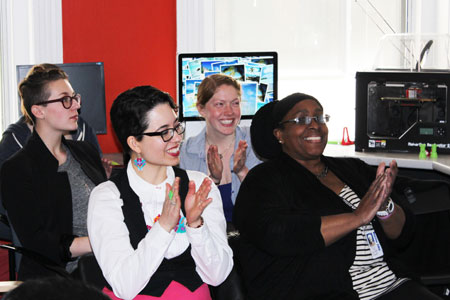
Students and staff members applaud following a presentation at the Games for Social Change open house at the Engagement Game Lab on April 25. (Photo by Dan O’Brien)
Categories